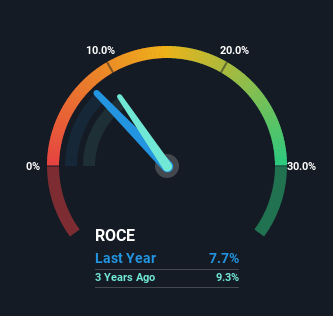- Hong Kong
- /
- Consumer Services
- /
- SEHK:1756
Be Wary Of China Vocational Education Holdings (HKG:1756) And Its Returns On Capital

If we want to find a stock that could multiply over the long term, what are the underlying trends we should look for? Firstly, we'd want to identify a growing return on capital employed (ROCE) and then alongside that, an ever-increasing base of capital employed. Basically this means that a company has profitable initiatives that it can continue to reinvest in, which is a trait of a compounding machine. However, after investigating China Vocational Education Holdings (HKG:1756), we don't think it's current trends fit the mold of a multi-bagger.
What Is Return On Capital Employed (ROCE)?
For those that aren't sure what ROCE is, it measures the amount of pre-tax profits a company can generate from the capital employed in its business. To calculate this metric for China Vocational Education Holdings, this is the formula:
Return on Capital Employed = Earnings Before Interest and Tax (EBIT) ÷ (Total Assets - Current Liabilities)
0.077 = CN¥391m ÷ (CN¥6.4b - CN¥1.3b) (Based on the trailing twelve months to February 2022).
Thus, China Vocational Education Holdings has an ROCE of 7.7%. On its own, that's a low figure but it's around the 9.1% average generated by the Consumer Services industry.
View our latest analysis for China Vocational Education Holdings

In the above chart we have measured China Vocational Education Holdings' prior ROCE against its prior performance, but the future is arguably more important. If you'd like to see what analysts are forecasting going forward, you should check out our free report for China Vocational Education Holdings.
How Are Returns Trending?
When we looked at the ROCE trend at China Vocational Education Holdings, we didn't gain much confidence. Around five years ago the returns on capital were 11%, but since then they've fallen to 7.7%. However, given capital employed and revenue have both increased it appears that the business is currently pursuing growth, at the consequence of short term returns. If these investments prove successful, this can bode very well for long term stock performance.
On a side note, China Vocational Education Holdings has done well to pay down its current liabilities to 20% of total assets. That could partly explain why the ROCE has dropped. Effectively this means their suppliers or short-term creditors are funding less of the business, which reduces some elements of risk. Since the business is basically funding more of its operations with it's own money, you could argue this has made the business less efficient at generating ROCE.
Our Take On China Vocational Education Holdings' ROCE
While returns have fallen for China Vocational Education Holdings in recent times, we're encouraged to see that sales are growing and that the business is reinvesting in its operations. And there could be an opportunity here if other metrics look good too, because the stock has declined 41% in the last year. So we think it'd be worthwhile to look further into this stock given the trends look encouraging.
Since virtually every company faces some risks, it's worth knowing what they are, and we've spotted 4 warning signs for China Vocational Education Holdings (of which 1 is a bit unpleasant!) that you should know about.
For those who like to invest in solid companies, check out this free list of companies with solid balance sheets and high returns on equity.
New: AI Stock Screener & Alerts
Our new AI Stock Screener scans the market every day to uncover opportunities.
• Dividend Powerhouses (3%+ Yield)
• Undervalued Small Caps with Insider Buying
• High growth Tech and AI Companies
Or build your own from over 50 metrics.
Have feedback on this article? Concerned about the content? Get in touch with us directly. Alternatively, email editorial-team (at) simplywallst.com.
This article by Simply Wall St is general in nature. We provide commentary based on historical data and analyst forecasts only using an unbiased methodology and our articles are not intended to be financial advice. It does not constitute a recommendation to buy or sell any stock, and does not take account of your objectives, or your financial situation. We aim to bring you long-term focused analysis driven by fundamental data. Note that our analysis may not factor in the latest price-sensitive company announcements or qualitative material. Simply Wall St has no position in any stocks mentioned.
About SEHK:1756
China Science and Education Industry Group
An investment holding company, provides private higher education and vocational education services in the People’s Republic of China.
Proven track record with adequate balance sheet.
Similar Companies
Market Insights
Community Narratives


